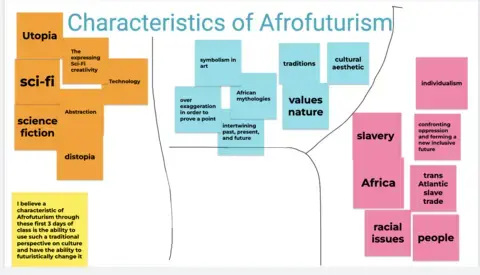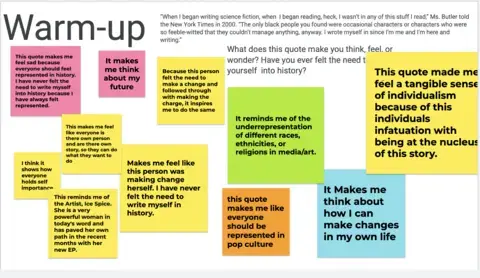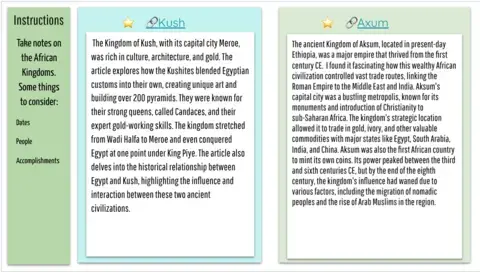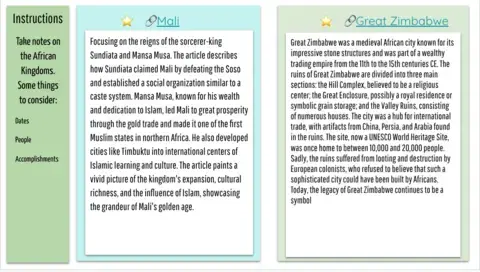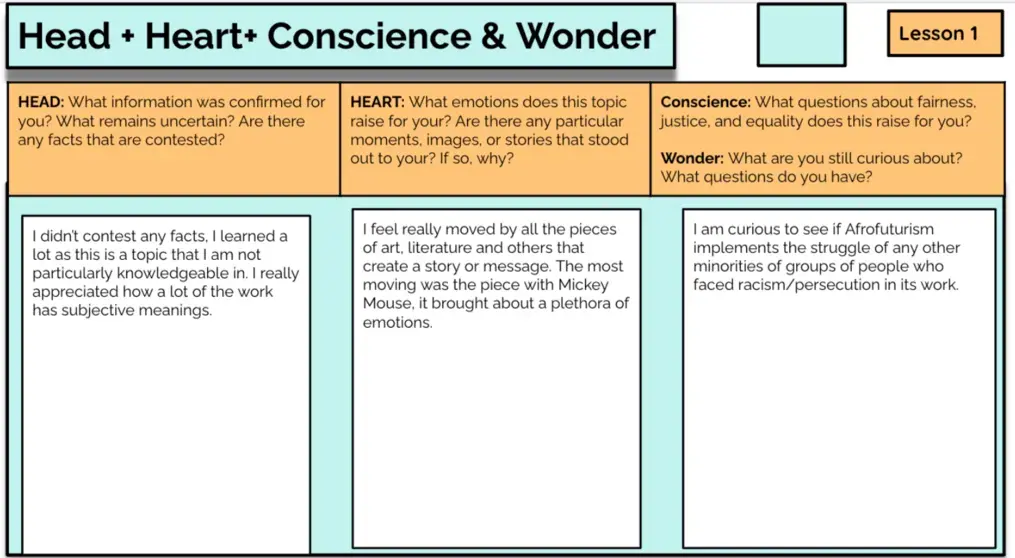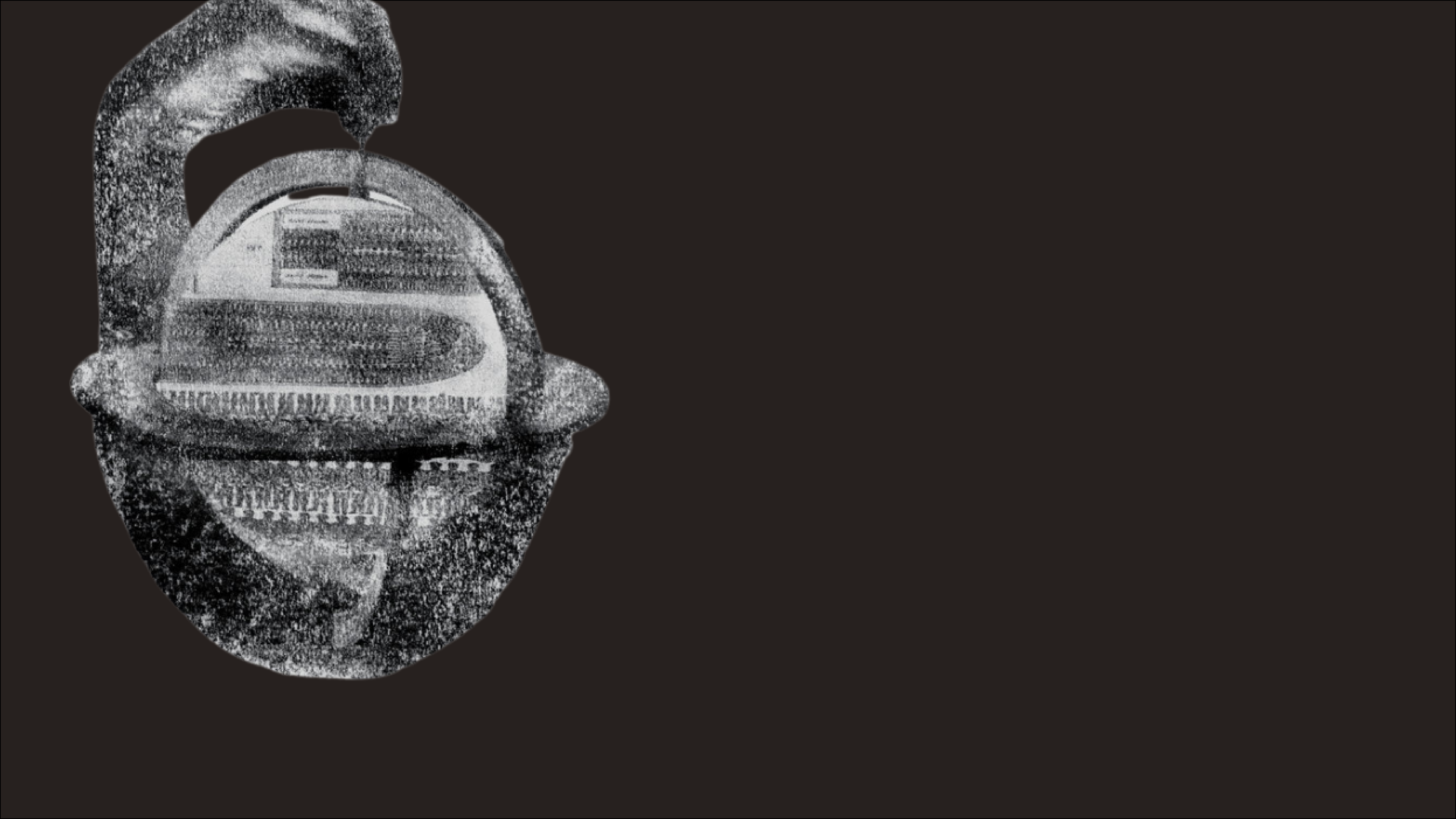This unit was created by Team NZINGA as part of the 2022 cohort of The 1619 Project Education Network. It is designed for facilitation across approximately seventeen lessons.
Objectives:
Students will be able to...
- Understand the motivations for Black people to create stories, art, and music and engage in political advocacy.
- Explain how Afrofuturistic work can inform us about racial struggles and achievements in the United States.
- Contextualize Afrofuturistic popular culture within its socioeconomic and historical framework, beginning in the U.S. and extending into the Caribbean and Africa.
- Communicate reading and research effectively through oral presentations and discussion.
Unit Overview:
Afrofuturism is a cultural movement that incorporates elements of science fiction, fantasy, and magical realism into art, literature, and other forms of media, with a particular focus on the experiences and perspectives of African Americans. It often explores the intersection of technology and the African diaspora, and incorporates themes of resistance and empowerment.
Afrofuturism often challenges traditional narratives and stereotypes about Black people, and it offers alternative visions of the future that are inclusive and empowering. It can also be seen as a way of reclaiming and reimagining African cultural traditions and spirituality in a modern context.
Greg Tate said, “Black people live the estrangement that science fiction writers imagine.” In this unit, we will explore how Afrofuturism combines elements of African mythology, science fiction, African Diaspora history, magic, realism, and political fantasy in Black expressive texts across multimedia and artistic forms. Considering a diverse array of practitioners, this unit analyzes how African diaspora cultural producers—writers, visual artists, musicians, and filmmakers—use Afrofuturism to critique racial asymmetries in the present (or past) and to imagine as yet unrealized free Black futures.
By incorporating Afrofuturism into the study of Black History, we hope to promote diversity and inclusion. By exposing students to a wide range of perspectives and experiences, Afrofuturism can help to broaden their understanding of the world and to challenge traditional narratives and stereotypes. This can create a more inclusive and equitable learning environment, and it can help to foster a greater sense of empathy and understanding among students.
Another potential outcome is the promotion of critical thinking and creativity. Afrofuturist themes and imagery often challenge conventional ways of thinking and can inspire students to imagine alternative futures and possibilities. This can promote higher-level thinking skills and can encourage students to be innovative and imaginative in their thinking and problem-solving.
Performance Task:
Essay Prompt: Afrofuturism is currently present in a variety of contexts, including music videos, academic texts, and museums. Martine Syms, a visual artist and writer, positions her 2015 Mundane Afrofuturist Manifesto as a critical analysis, urging Black artists and activists to reshape, redefine, and recreate the dominant norms of Afrofuturism. Syms proposes an Afrofuturist perspective that downplays space adventures and otherworldly technological phenomena. Instead, she modifies Afrofuturism to include the more "mundane" advancements Black people are making on Earth in order to envision a more equitable space for future Black livelihood.
Responding to Syms’ call, write a 1-2 page argumentative paper explaining why a writer, activist, and/or other individual of your choice from the 18th and 19th centuries should be considered a proto-Afrofuturist. In your paper, describe how your chosen individual incorporates both the mundane and fantastical aspects of Afrofuturism into their life and/or body of work.
Seventeen lessons for teachers, including pacing, texts and multimedia resources, worksheets, slide presentations, and interactive gameboards for student learning. Download below, and scroll down to review key resources included in the unit plan.
Unit Resources
| Resources from The 1619 Project | The 1619 Project: Born on the Water by Nikole Hannah-Jones and Renée Watson, illustrated by Nikkolas Smith (video read-aloud) Poetry from The 1619 Project: A New Origin Story >1662: “Daughters of Azimuth” by Nikky Finney >1682: “Loving Me” by Vievee Francis >1740: “A Ghazalled Sentence After ‘My People ... Hold On’ by Eddie Kendricks >1740: “The Negro Act of 1740” by Terrance Hayes >1791: “Other Persons” by Reginald Dwayne Betts >1830: “We as People” by Cornelius Eady >1850: “A Letter to Harriet Hayden” by Lynn Nottage |
| Teacher-created Resources Used Throughout this Unit | Optional Afrofuturism Unit Note Catcher (Students can use this one document to take notes for the entire unit) >.pdf document >.docx document Exit Ticket >Downloadable PowerPoint >View-only Google Slides |
| Teacher-created Gameboards | >Gameboard for Exploring Proto-Afrofuturists #1: Arnold Gragston [.pdf] >Gameboard for Exploring Proto-Afrofuturists #2: Harriet Tubman [.pdf] |
| Afrofuturist and Proto-Afrofuturist Texts, Artworks, and Creations | Olivetti Studio 46 Typewriter Used by Octavia Butler, object from the Anacostia Community Museum Why should you read sci-fi superstar Octavia E. Butler?, video by Ayana Jamieson and Moya Bailey for TED-Ed The Sound of Afrofuturism, Spotify playlist by Julian Chambliss “Flying African Testimonials,” handout from TeachRock Various fine art by Costanza Knight High and Wide (Carrying the Rats to the Man), multimedia web story by Thornton Dial Red Spring Part I: Ancestral Memory, multimedia art exhibit by New York Live Arts AstroSankofa, artwork by Quentin VerCetty with commentary Afrofuturism Explained: Not Just Black Sci-fi, video from Inverse Quote from “Black to the Future: Interviews with Samuel R. Delany, Greg Tate, and Tricia Rose” by Mark Dery “Dr. Funkenstein,” song performance by Parliament “Moon Masque,” art by Lois Mailou Jones The Ooli Moves, animated video by Nicole Mitchell’s Black Earth Ensemble, based on Octavia Butler’s Lilith’s Brood “The Comet,” short story by W. E. B. Du Bois Afrofuturism Mixes Sci-fi and Social Justice. Here’s How It Works. video from Vox “The Mundane Afrofuturist Manifesto,” text by Martine Syms The Mundane Afrofuturist, documentary from KCET (56:34) Essay in “"A Past Unremembered: The Transformative Legacy of the Black Speculative Imagination" Exhibition Catalog (pages 1-11) |
| Texts and Resources Exploring African History and Geography | The True Size website “The Real Africa: Fight the Stereotype” "The Nubian Kingdom of Kush," article from National Geographic "The Kingdom of Aksum," article from National Geographic "Mali: A Cultural Center," article from Ancient Civilizations "Great Zimbabwe," article from National Geographic "Unearthing the Truth," article from The Economist Decolonizing History in Africa website |
| Texts and Resources Exploring the History of Enslavement | Slavery in the Medieval Mediterranean readings and worksheet (Please note that some of these readings may be inappropriate for some readers. Please read through the sources to determine if they align with your course standards and the learning expectations of your school community.) >.pdf handout >.docx handout Introductory video African American History from PBS Learning Media Middle Passage Analysis slide worksheet [.pptx] “Slavery in the American South” by the unit author >.pdf reading >.docx reading |
| Resources for Teacher Prep | P. Gabrielle Foreman, et al. “Writing About Slavery/Teaching About Slavery: This Might Help” community-sourced document, September 18, 2023. See Learning for Justice website for suggestions on how to teach “hard history.” Explore Resources and Information on Afrofuturist Writing, Art, and Culture from Columbia College Chicago. |
Common Core Standards:
CCSS.ELA-LITERACY.RH.9-10.2 Determine the central ideas or information of a primary or secondary source; provide an accurate summary of how key events or ideas develop over the course of the text.
CCSS.ELA-LITERACY.RH.9-10.3 Analyze in detail a series of events described in a text; determine whether earlier events caused later ones or simply preceded them.
CCSS.ELA-LITERACY.RH.9-10.6 Compare the point of view of two or more authors for how they treat the same or similar topics, including which details they include and emphasize in their respective accounts.
CCSS.ELA-LITERACY.RH.11-12.7 Integrate and evaluate multiple sources of information presented in diverse formats and media (e.g., visually, quantitatively, as well as in words) in order to address a question or solve a problem.
CCSS.ELA-LITERACY.RH.11-12.9 Integrate information from diverse sources, both primary and secondary, into a coherent understanding of an idea or event, noting discrepancies among sources.
New Jersey State Standards:
6.1.12.CivicsPD.1.a: Use multiple sources to analyze the factors that led to an increase in political rights and participation in government.
6.1.12.HistoryUP.2.b: Analyze the impact and contributions of African American leaders and institutions in the development and activities of Black communities in the North and South before and after the Civil War.
Summative Assessment: Essays on Individuals Who Embody Mundane Afrofuturism
In this unit, students define the concepts of Afrofuturism, proto-Afrofuturism, and mundane Afrofuturism. In their exploration of important creations and figures in Black arts, culture, and history, students are asked to consider how the subject under study does and does not embody the tenets of these traditions. In their summative essay, students choose one individual who they believe embodies tenets of mundane Afrofuturism, at once explaining the concept and how their chosen subject exemplifies it.
Harriet Tubman's life serves as an illustration of what Afrofuturism can represent. It goes beyond envisioning futures in distant galaxies. It is about acknowledging the strength, bravery, and foresight of individuals who have shaped our history. Tubman's fusion of deeds and spiritual insight makes her a pioneer in Afrofuturism—a reflection of its vibrant tapestry defined by Martine Syms.
Excerpt from a Student Essay
Formative Assessment: Paintings Inspired by Research on Early African Civilizations
Artist Aaron Douglas (1899-1979) gained the nickname "the father of African arts," but responded that he was not the father, but the son of African arts. Douglas is one of many artists, creators, and leaders whose work students explore in this unit. As one of their formative assessments, students research early African civilizations and create a painting in the style of Douglas's work that expresses what they learned. View example student artwork below.
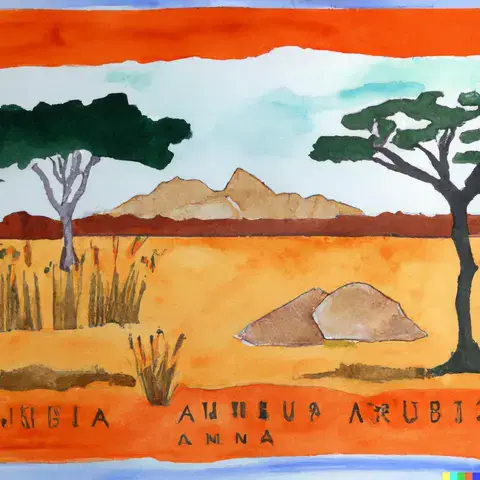
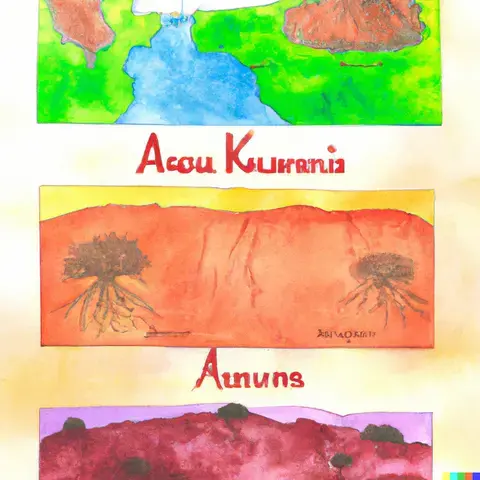
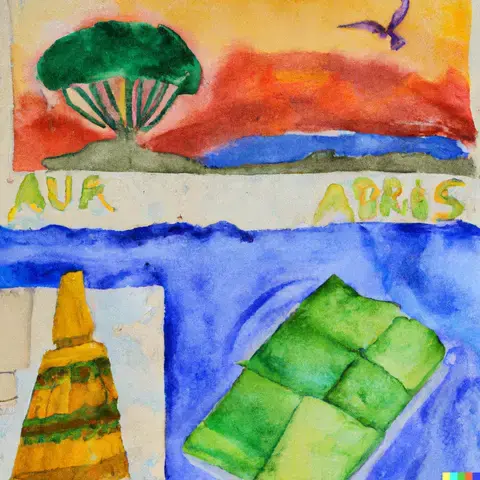
Formative Assessment: Notetaking and Reflections
Throughout the unit, students capture their learning and engage in independent and collaborative reflection through a unit note catcher, individual worksheets, small group Google Slides, and whole class Jamboards. A small sampling of the kinds of notes and reflections Team NZINGA's students completed are captured below.
